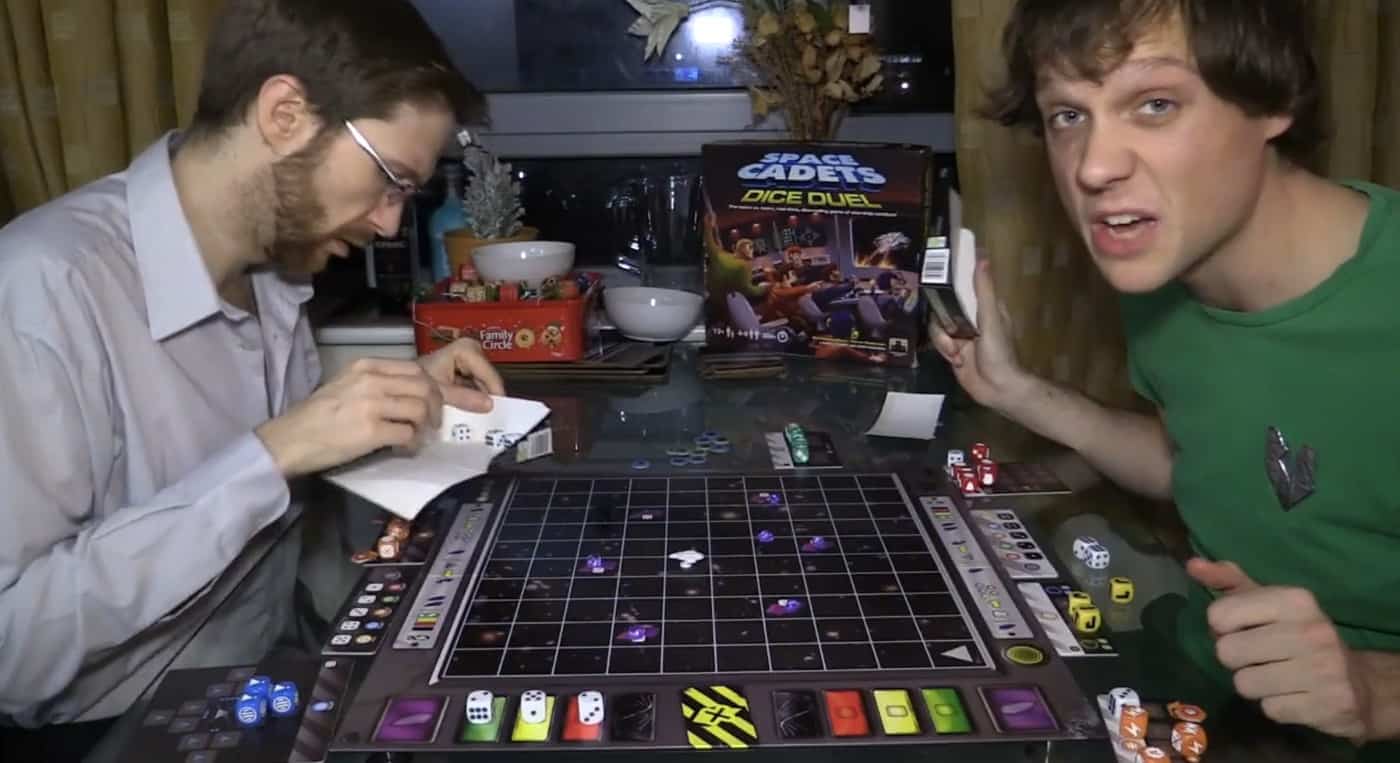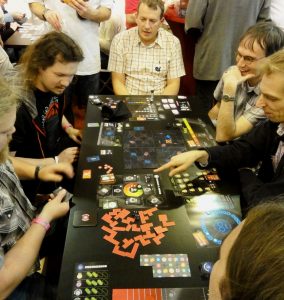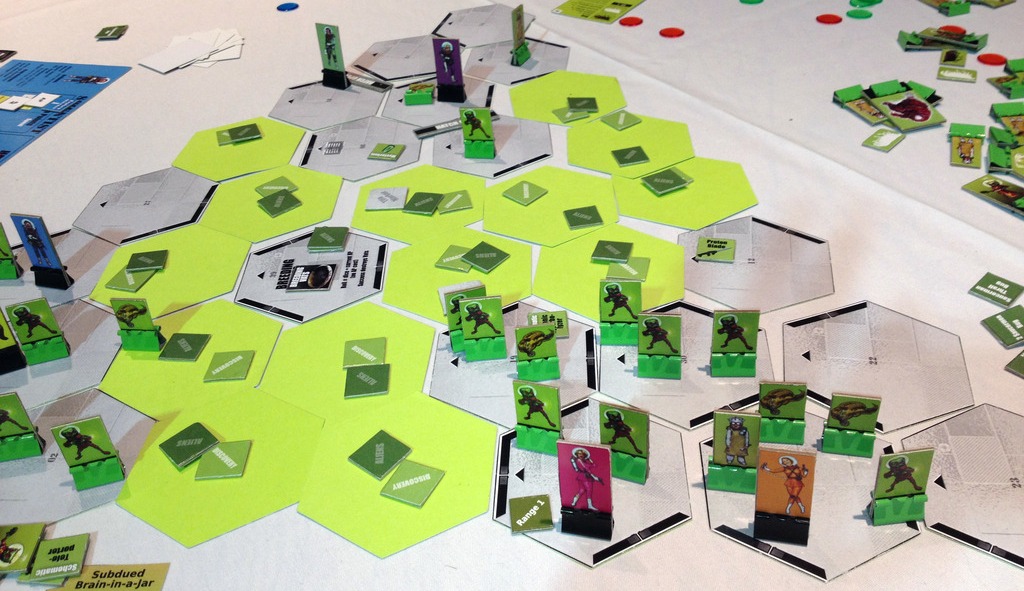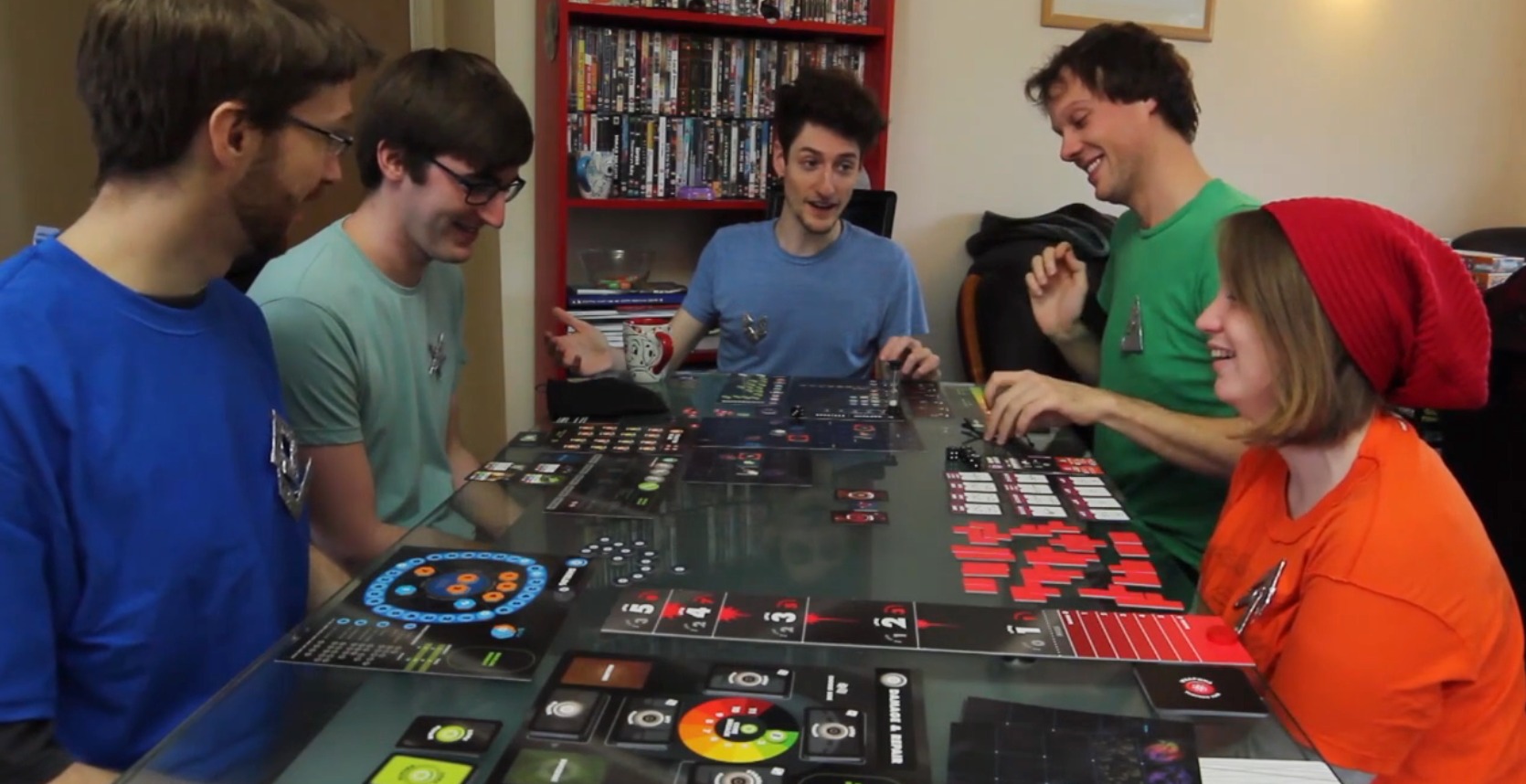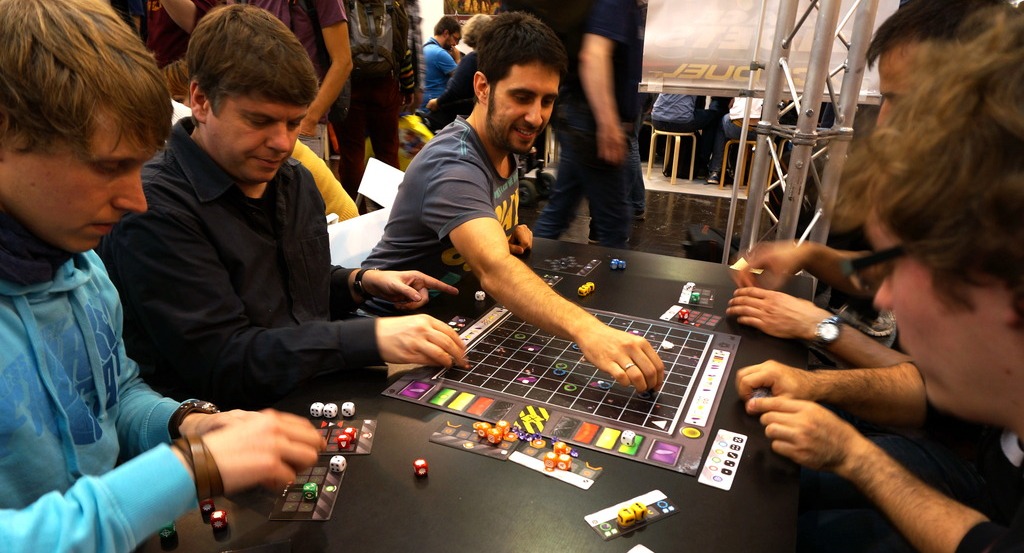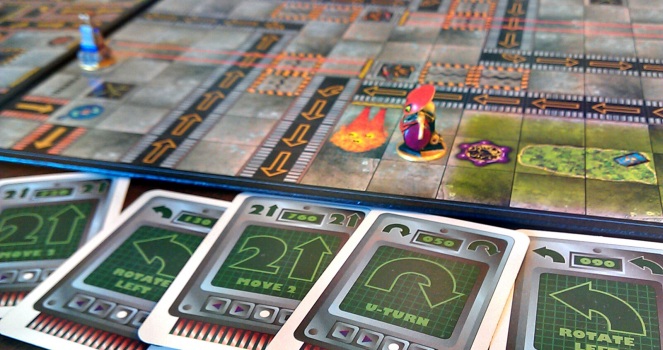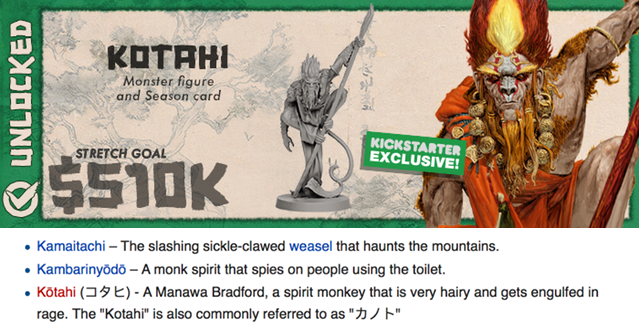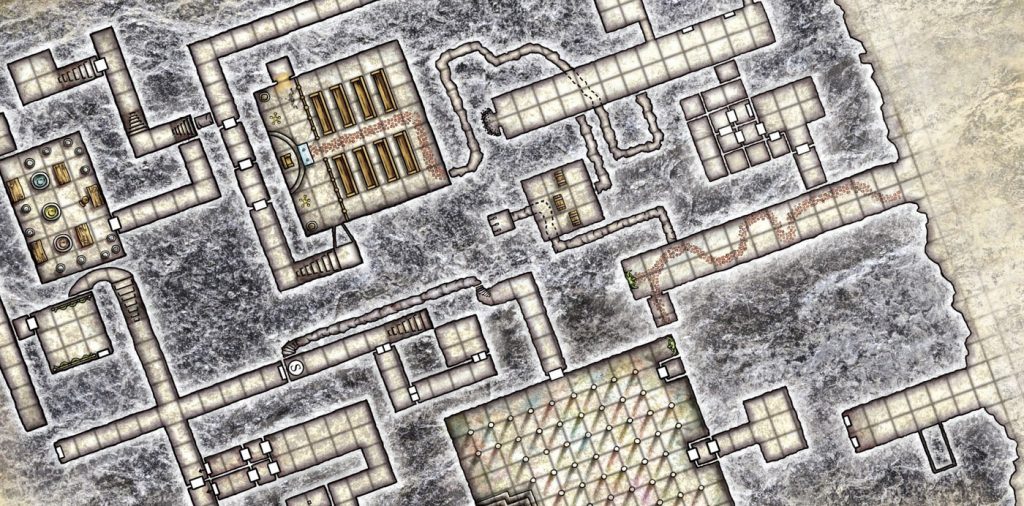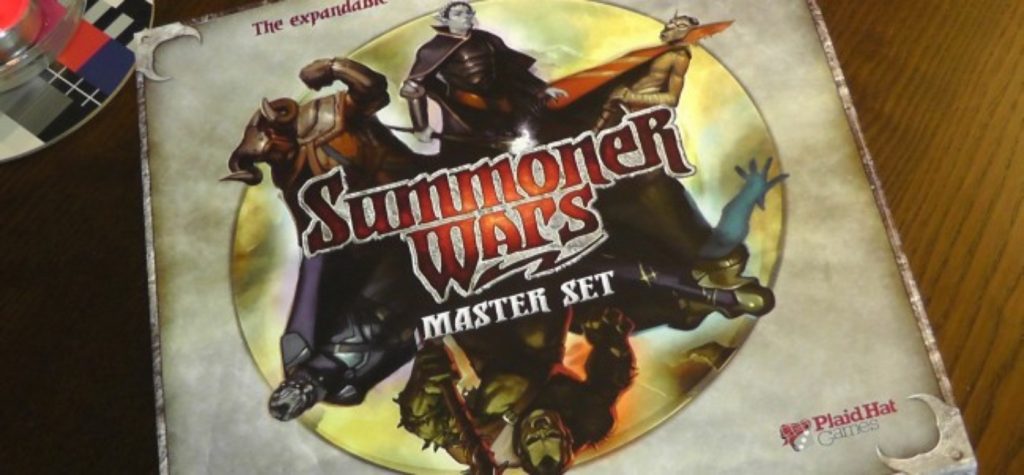[Following on from last month’s interview with Eric Zimmerman, we dispatched intergalactic bounty hunters to next track down Geoff Engelstein, the man behind SU&SD favourites Space Cadets and Space Cadets: Dice Duel. With two expansions and a new Space Cadets game on the horizon, we needed details on the future of this runaway brand, and how it came to be.]
Quinns: Wake up! Alright “Geoff”, you can earn your freedom by answering no less than eight questions.
Geoff: What? You wanted an interview? You could have just asked.
Quinns: Oh, you’d have liked that, wouldn’t you. NOW: The year of Space Cadets, eh? Does the prospect of continuing to work with the Space Cadets license exhaust you at all? No new and fair pastures for Mr. Engelstein?
Geoff: I’m actually invigorated by finding different ways to express the Space Cadets theme and ‘universe’, such as it is. The basic idea is players trying to muddle through and work together in spite of things spiraling more and more out of control. And there are a lot of fun ways to bring that theme to life.
That being said, we’re actively working on several projects that are not part of the Space Cadets line, including a party game, and a strategic-level World War 2 game.
And of course it helps that other designers, like Dan Raspler and Al Rose on Space Cadets: Away Missions, are doing a much better job than I could ever do at bringing engaging new ideas to the table.
Quinns: Can you tell us anything about them? I promise we won’t let Matt be captain when we play on Away Missions.
Geoff: I can’t say too much about the party game yet – still very embryonic. But the WW2 game is one I’ve been working on for close to ten years now. It keeps getting put back on the shelf, but I think we’re finally getting close. It’s had a really long incubation period because it’s radically different than any other game of it’s type. It is focused on planning and intel – trying to keep your own operations a secret, misdirect your opponent, and figure out what they are trying to do. And just getting the mechanics to a point where they are easy to manage and not fiddly, but still gives the feel we want, has been a huge challenge. And I think the lesson I learned about simplifying game designs has really paid off in this case. I just didn’t know enough before about game design to get the war game to a good place.
Quinns: On hearing about a Space Cadets expansion, we all did a double take. Surely this game is complicated enough. SURELY. It’s such an intimidating game to teach already!
Geoff: Hah! Well, a big chunk of the expansion is designed to make it easier for players to get into Space Cadets. A number of the new missions are either shorter in length, or remove one or more stations to make it easier for new players to focus on just certain aspects.
For example, one of the new missions has the players commanding a Space Station that is being swarmed by enemy ships. So there is no Helm in that one. Players just need to focus on Locking on and shooting. And maybe setting up the occasional shield.
We are also looking at adding to the missions different levels of victory. So, for example, in the first mission of the original Space Cadets you are supposed to get three crystals and jump home. We are adding a ‘minor victory’ condition if you grab two crystals and jump, or a draw if you get one and jump. So beginning teams can focus on simpler short term goals. It also gives the Captain something else to think about. Do we go for that last crystal and possibly die in a blaze of glory? Or just take what we’ve got and try to do better next time? It enhances the role-playing elements of the game, which make it shine.
We worked at adding a whole new station to the game, Science, where you could research new enhancements to the other stations. But everything is so inter-related that it just felt bolted on. So instead we took the idea of Science, and gave each station some extra options, but at the cost of generating ‘stress’ points, which may result in a Core Breach.
For example, for one stress point, Weapons can retake a shot. So in one sense it makes it easier for the players, because they have an option to mitigate problems. But they are trading short term gain for longer term problems, as Core Breaches might get triggered if they use the special abilities too liberally.
Quinns: Can you talk a little about what to expect from Away Team?
Geoff: I’m really excited about Away Team. As you know we didn’t design this one. It’s actually a ‘prequel’ of sorts, as it takes place in our Solar System, and has a 50’s sci-fi vibe to the missions and artwork.
The game is fully cooperative, and consists of a series of increasingly difficult missions as you fight off the aliens. The players are working their way through alien ships, space stations, and other structures, shooting enemies with ray guns, and other neat equipment, some of which you bring with you, and some that you find along the way.
Unlike the other Space Cadets game there is no real-time element. But you definitely get the sense of time encroaching on you as the game progresses. I played a game of it last weekend, and our objective was to shut down the Astrogator and find and destroy the Master Brain. We docked at the outside of the alien station, breached the hull, and ended up having to split the party to locate both objectives. As the alien forces built up we had to make a mad dash back to our shuttle, and escaped just in the nick of time, with hordes of aliens racing towards us. As you can tell it’s got a very cinematic feel.
And if a single player dies the whole team loses, so it keeps everyone involved to the end.
Quinns: Oh wow. Since playing Ghost Stories, I’ve been looking for another game that lets me sacrifice myself for the greater victory. Though you make it sound more heroic and less farcical than Space Cadets usually is. I always thought players showcasing breathtaking stupidity was the keystone of the brand.
Geoff: Well, there’s a fine line between making the players feel stupid, and making stupid things happen. But we absolutely wanted a skill factor in Space Cadets, and that’s the risk you take with any skill-based system.
Quinns: We know from the Gametek segments that you’re a thoughtful man. What parts of Space Cadets or Dice Duel work despite being counter-intuitive?
Geoff: I guess I would point to a few things that work way better than I expected. First, Tractor Beams in the original Space Cadets is a memory matching game. I thought it would be way too simple, but it really drives people crazy. I find it very entertaining to watch.
Relating to Tractor Beams, there is one damage card that forces you to rotate the display by 180 degrees. We just threw that in there as a lark during a playtest once. I figured that people wouldn’t care, and would just walk to the other side of the table or some such thing. But every time that card comes up, especially when people don’t know it’s there, a big groan just goes through the players. It’s totally psychological, and very interesting.
On the Dice Duel side, the mechanics had to be as simple as possible due to the real time nature, so they needed to be intuitive to work. But the counter-intuitive thing that unlocked the design for me is that the dice aren’t used like dice are normally used, because you can keep rolling until you get what you want.
In Dice Duel the dice are actually random timers. And it works so well (I think) because it forces the players to choose between what may not be the best result with what may be good enough for now. Plus it really needs to have that other team across the table dealing with the same issues as you are. People have asked for a completely coop Dice Duel mission, with just one team, but I don’t think you’d get the same experience. Just playing against a clock isn’t nearly as exciting, in my opinion.
Quinns: Idle one to finish with. What game do you wish you’d designed?
Geoff: Neuroshima Hex. That’s an absolutely brilliant design that makes me jealous of the designer, Michal Oracz, every time I play it.
Quinns: See, this is what I’m still trying to figure out about you! You have a podcast where you talk about the science and psychology of game design. You wish you designed Neuroshima, which is this brilliant but very tight tactics game with little room for comedy or personal flair. Then you design Space Cadets and Dice Duel! Two of the silliest, most left-field games in recent years. Do you think much about humour? Do you think other designers think enough about humour?
Geoff: Oh, I think about humor in games a lot. I think there are two different ways to introduce humor into a game. The easiest is with component-based humor, like funny names on cards, or cute flavor text. Munchkin is based on this type of humor, and I’m sure you can think of many others. The problem with this type of humor is that it can get unfunny very quickly, as you see the same card for the tenth time. That’s why these games need lots of expansions, to keep the humor fresh. Fortunately for game companies, this can also lead to lots of cash as players keep buying them, but that’s a separate topic.
The second type of humor is to create a situation where the players and game systems create the humor. That’s a lot harder to do, but ultimately is more sustainable.
Robo Rally is a great example of this. And this is what we tried to do with Space Cadets, by letting situations develop within the games that players needed to deal with, and giving space for spectacular failure and success. Others will decide if we were successful or not, of course.
Going back to your first point, you can take analytical observations about game design and apply them to any project. As an example, I was doing some segments about narrative arc in games, and realized that Space Cadets really did not have a great ending. Both victory and defeat tended to come anticlimactically, and the game suffered for it. People remember any activity much more fondly if it ends strongly. So we first implemented the Jump mechanic, which added a dramatic victory, but left dying to just losing your last hit point. That proved an unsatisfying way to die, so we added the Core Breach mechanic to make losing more exciting. It also puts the players in control over the endgame, which makes losing seem less arbitrary.
Both of these changes were huge positives to the game play and the feeling of being in a story. And this came directly from reflecting on what works in games and what doesn’t.
By the way I have to give props to my son Brian for the Core Breach system, which is perhaps my favorite part of Space Cadets. He pushed to have it be a part of the regular station activities, which worked unbelievably well.
Quinns: Agreed. And thank you so much for your time!
Geoff: Well, you tied me up, I couldn’t leave.
Quinns: That’s right.

